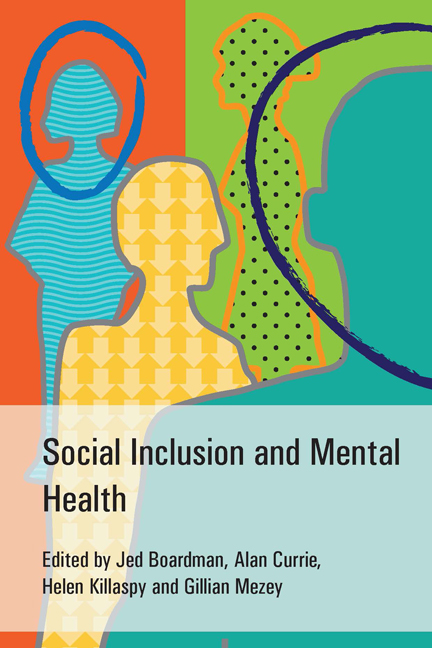Book contents
- Frontmatter
- Contents
- List of contributors
- List of tables
- Foreword
- Preface
- Acknowledgements
- Scoping Group on Social Inclusion, Royal College of Psychiatrists
- Part 1 What is social exclusion?
- Part 2 Social exclusion: the scope of the problem
- 7 The extent of disadvantage, poverty and social exclusion in the UK
- 8 How are people with mental health problems excluded?
- 9 Social exclusion in specific social groups and individuals with mental health problems
- 10 Social exclusion and people with mental health problems: developing a clearer picture
- 11 Finding acceptance: the experiences of people who use mental health services
- 12 Social inclusion from the carer's perspective
- Part 3 Working towards inclusive psychiatry
- Index
10 - Social exclusion and people with mental health problems: developing a clearer picture
from Part 2 - Social exclusion: the scope of the problem
- Frontmatter
- Contents
- List of contributors
- List of tables
- Foreword
- Preface
- Acknowledgements
- Scoping Group on Social Inclusion, Royal College of Psychiatrists
- Part 1 What is social exclusion?
- Part 2 Social exclusion: the scope of the problem
- 7 The extent of disadvantage, poverty and social exclusion in the UK
- 8 How are people with mental health problems excluded?
- 9 Social exclusion in specific social groups and individuals with mental health problems
- 10 Social exclusion and people with mental health problems: developing a clearer picture
- 11 Finding acceptance: the experiences of people who use mental health services
- 12 Social inclusion from the carer's perspective
- Part 3 Working towards inclusive psychiatry
- Index
Summary
In the previous chapters, we have seen that there is an association between mental health problems and social exclusion across all the domains that have been examined (material, productivity, social, political and health). This differs across the range of disorders and is influenced by the person's socioeconomic and social identity group. It is clear that mental health problems are a significant risk factor for poor economic, health and social outcomes, however the direction of causality is often difficult to establish. Nevertheless, it would appear that the causal pathways can operate in both directions and that mental health problems can be both a cause and consequence of exclusion. This emerging complexity of the causal relationships requires further exploration and in this chapter we shall try to build a descriptive model of exclusion and mental health problems. We will explore further the relationship between mental health problems and exclusion and examine some of the main drivers, but first it is necessary to introduce the related topic of mental health and well-being.
Mental health and well-being
There is a growing literature on mental health and well-being (psychological well-being or positive mental health) which focuses on people's strengths in contrast to their deficits. This echoes the long-standing literature on health, as opposed to ill health or disease, which in the 20th century was encapsulated by the World Health Organization's (WHO) definition of health as:
a state of complete physical, mental and social well-being and not merely the absence of disease or infirmity (WHO, 1948).
This perspective is now reflected in their definition of positive mental health as:
a state of well-being in which the individual realizes his or her own abilities, can cope with the normal stresses of life, can work productively and fruitfully, and is able to make a contribution to his or her community (WHO, 2005).
Essentially, mental well-being is about people's lives going well (Huppert, 2008) and is concerned not only with a positive subjective state (emotion and cognition), but also with social functioning and interaction and the ability to deal with adversity and painful emotions.
- Type
- Chapter
- Information
- Social Inclusion and Mental Health , pp. 210 - 231Publisher: Royal College of PsychiatristsFirst published in: 2017



